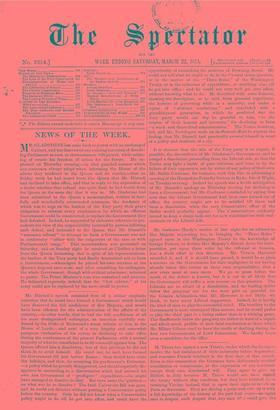Mr. Disraeli's speech consisted first of a rather emphatic assertion
that he could have formed a Government which would have deserved the full confidence of Her Majesty, and would have been efficient for the administration of the affairs of the country,—in other words, that he had the full confidence of all his more distinguished colleagues, an assertion carefully con- firmed by the Duke of Richmond's warm tribute to him in the House of Lords,—and next of a very lengthy and somewhat pompous vindication of his course in declining to take office during the continuance of the present Parliament, with a normal majority of what he considered to be 88 votes still against him. The -Queen offered him a dissolution, but of this privilege he did not think fit to avail himself. He could not, he said, have formed his Government till just before Easter ; then would have come the holidays, and then, by accepting his predecessor's Estimates, —a policy which he greatly disapproved, and should especially dis- approve in succeeding to a Government which had accused his own last Government of " profligate " expenditure,—he might have managed to dissolve in May. But then came the question— on what was he to dissolve ? The Irish University Bill was gone, and he could not dissolve without putting a Conservative policy before the country. Only he did not know what a Conservative policy ought to be till he got into office, and could have the
opportunity of ransacking the archives of Downing Street. He could not tell what he ought to do in the Central-Asian question, or in the matter of the "Three Rules" of the Washington Treaty, or in the reduction of expenditure, or anything else, till he got into office ; and he could not very well get into office, without knowing what to do. He described with some humour, drawing his description, as he said, from personal experience, the horrors of governing while in a minority, and under a regime of " abstract resolutions," and concluded with a grandiloquent peroration, in which he predicted that the Tory party would one day be grateful to him, "as the trustee of their honour and interests," for declining to form " a weak and discredited administration." The Tories, however, felt, and Mr. Newdegate made an ineffectual effort to express the feeling, that Mr. Disraeli had practically avowed himself in want of a policy and destitute of a cry.


































